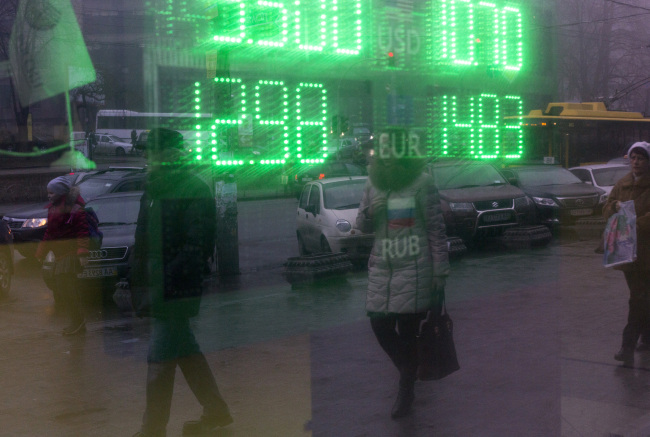International Monetary Fund staff endorsed a $17 billion loan to Ukraine to help the government pay its debts amid a projected economic contraction of 5 percent this year, according to government officials who have seen the recommendations.
The staff’s report was delivered to members of the IMF’s 24-seat board late on April 22, according to the officials, who spoke on condition of anonymity to discuss internal documents. The staff proposed an April 30 board meeting to consider the loan package, they said.
An IMF loan would clear the way for additional aid from the European Union, the U.S. and other donors at a time of escalating tensions between Ukraine and Russia. After weeks of talks with the government in Kiev, IMF staff concluded that Ukraine needs financing from the fund that’s at the higher end of the $14 billion to $18 billion range initially announced.
 |
Pedestrians are reflected in the window of a foreign currency exchange store advertising its rates in Kiev, Ukraine. (Bloomberg) |
“The quick approval of the IMF program is absolutely essential to unlock European and multilateral money,” said Robert Kahn, a senior fellow for international economics at the Council on Foreign Relations in Washington and a former IMF and World Bank official.
Conny Lotze, an IMF spokeswoman, declined to comment.
Russia vowed to defend its citizens in neighboring Ukraine after the government in Kiev said it’s resuming operations to oust militants from eastern cities, in the latest development in the standoff between the two former Soviet republics.
“That’s a concern ― that the worsening political situation in Ukraine may hamper the success of the program,” Paulo Nogueira Batista, who represents Brazil and 10 other countries on the board, said in a telephone interview this week.
The crisis is putting pressure on the economies and markets in both nations.
Russia failed to sell local-currency bonds due August 2023 at Wednesday’s auction, and the Micex Index closed down 0.5 percent. Ukrainian bonds fell, lifting yields on the government’s dollar-denominated notes due 2023 by 0.07 percentage point to 10.04 percent, the highest in a month, data compiled by Bloomberg show.
The IMF report describes the economic outlook, financing needs and policy steps Ukraine agreed to take in exchange for the loan. The staff’s forecast for a 5 percent contraction this year is more pessimistic than the government’s outlook for a 3 percent drop in gross domestic product.
Measures the fund has recommended for Ukraine include a flexible exchange rate, phasing out subsidies for natural gas and gradual budget cuts. Ukraine’s parliament has already passed some of them to secure the funding.
“The conditions under which we enter into a program is for that country to deliver on its commitment and restore its financial situation so that it can finance itself, refinance itself, and operate without support from the IMF,” Managing Director Christine Lagarde said at an April 10 press conference in response to a question about Ukraine.
Ukraine’s presidential election is scheduled for May 25, and the new government will have to carry out conditions of the IMF loan. Twice since 2008, the IMF froze loans to Ukraine after governments at the time balked at measures they had agreed to carry out. (Bloomberg)








